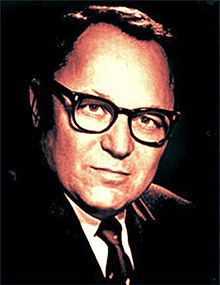Arthur Hertzberg
Arthur Hertzberg (born June 9, 1921 in Lubaczów , Poland ; died April 17, 2006 in Westwood , New Jersey) was a Polish - American Conservative rabbi who played an important role in the development of postwar Judaism. He taught as a rabbi and wrote fundamental works on modern anti-Semitism and Zionism .
Life
At the age of five, Arthur Hertzberg left Europe with his parents and came to the Orthodox community in Youngstown, Ohio , where, as he later recalled, he spoke out against the literary significance of the Talmud , the Kabbalah , as a teenager and the writings of Hasidism should be less than, for example, Homer's Iliad or Odyssey , or Dante's Inferno . His father was an Orthodox rabbi, rooted in Ashkenazi Judaism . He instructed Arthur in the intricacies of the Talmud and the other great writings of Judaism. Although Hertzberg later moved from Orthodoxy to Conservative Judaism, he once said: "I never used my 'heresy' as an excuse for preferring culture to a majority of my own." In 1950, he married Phyllis Cannon, and the couple became parents two daughters.
In his more than fifty-year career, Hertzberg worked as a community rabbi, as president of the American Jewish Policy Foundation and the American Jewish Congress , vice-president of the World Jewish Congress and represented Judaism in the Catholic-Jewish dialogue during John XXIII's tenure . in the forefront. He joined Martin Luther King, Jr. in 1963 . at his " March on Washington for Work and Freedom, " the culmination of the American civil rights movement. He also played a major role in the discussion with the Catholic Church about the failure to publish documents on Pius XII. and the Holocaust . Also noteworthy is his clear criticism of Israel's political behavior towards Palestine . Arthur Hertzberg was also a member of the board of trustees of the Abraham Geiger College in Potsdam, the first German rabbinical seminary since the Shoah.
In his main work The French Enlightenment and the Jews: The Origins of Modern Anti-Semitism (literally: The French Enlightenment and the Jews: The origin of modern anti-Semitism ) from 1968 he showed how the origin of modern anti-Semitism affected the “liberal” worldview enlightened philosophers as Voltaire can be traced back. Similarly, his 1972 work The Zionist Idea: A Historical Analysis and Reader established the studies of Zionism, describing modern Zionism as a secular movement to re-establish Jewish identity alongside the widespread nationalism of other peoples. Hertzberg, who described himself as pragmatic and liberal, saw no contradiction between his political judgments and his reverence for Jewish traditions, which were detached from religious fundamentalism .
Fonts (selection)
- The French Enlightenment and the Jews. The Origins of Modern Anti-Semitism. 1968.
- Zionist Idea. A Historical Analysis & Reader. 1972.
- The Jews in America. (German: Shalom, Amerika 324. The history of the Jews in the new world. Knesebeck Verlag, Munich 1992. currently under ISBN 3-633-54110-1 .)
- Judaism. (German: Judaism. The foundations of the Jewish religion. Knesebeck Verlag, Munich 1995, currently under ISBN 3-499-16522-8 )
- With Aron Hirt-Manheimer: Jews. (German: Who is Jude? The essence and character of a people. Carl Hanser Verlag, Munich 2000, currently under ISBN 3-423-30806-0 .)
Quotes
- "I became American by refusing to conform."
- "Everything that I have written in the last half century is based on the premises that I learned from the chaplain and the baron."
- "I never identified the ghetto with backwardness."
See also
Web links
- Literature by and about Arthur Hertzberg in the catalog of the German National Library
- Arthur Hertzberg on Judaism. On: hagalil.com 2000.
| personal data | |
|---|---|
| SURNAME | Hertzberg, Arthur |
| SHORT DESCRIPTION | Polish-American rabbi |
| DATE OF BIRTH | June 9, 1921 |
| PLACE OF BIRTH | Lubaczów , Poland |
| DATE OF DEATH | April 17, 2006 |
| PLACE OF DEATH | Westwood , New Jersey |
